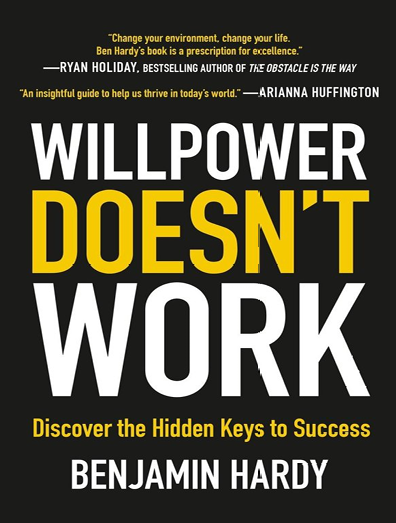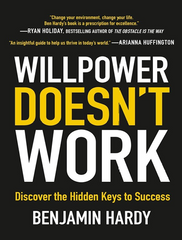Before you leave...
Take 20% off your first order
20% off
Enter the code below at checkout to get 20% off your first order


Willpower Doesn’t Work by Benjamin Hardy explores the idea that relying solely on willpower for achieving goals is ineffective. Instead, Hardy argues that creating the right environment and building habits are crucial for success. He suggests that we should focus on designing our environments to support our goals, leveraging external factors, and making automatic behaviors that align with our objectives.
The book emphasizes the importance of systemic changes over sheer willpower and provides practical strategies for altering our surroundings and habits to foster success.
Here are five key points from Willpower Doesn’t Work by Benjamin Hardy:
Environment Shapes Behavior: Hardy argues that our environment plays a significant role in determining our behaviors. By designing our surroundings to support our goals, we can reduce the need for willpower. For example, if you want to eat healthier, keeping junk food out of your home can help.
Focus on Systems, Not Goals: Rather than relying on willpower to achieve goals, Hardy suggests creating systems and routines that make progress easier. Systems involve building habits and structuring your life in a way that naturally leads to achieving your goals.
Behavior is a Product of Context: Your actions are influenced by the context in which you find yourself. Hardy emphasizes the importance of understanding and changing your context to foster better behaviors. This includes both physical surroundings and social influences.
Use External Accountability: Having external accountability—such as a coach, mentor, or accountability partner—can significantly enhance your ability to follow through on your commitments. This external pressure can help compensate for any lapses in willpower.
Commit to Identity-Based Change: Hardy advocates for changing your identity rather than just setting specific goals. By shifting your self-concept to align with your desired outcomes, you make it easier to adopt new behaviors and habits. For example, seeing yourself as a "healthy eater" rather than just someone who wants to eat healthily can lead to more consistent behavior change.
These points emphasize the idea that environment and systematic approaches are often more effective than relying solely on willpower
Thanks for subscribing!
This email has been registered!
Take 20% off your first order
Enter the code below at checkout to get 20% off your first order